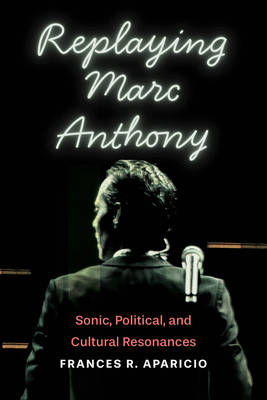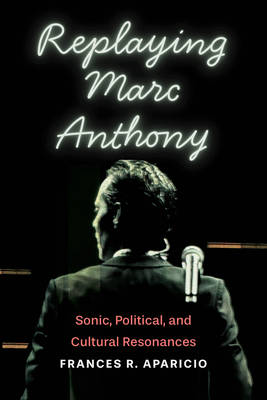
- Afhalen na 1 uur in een winkel met voorraad
- Gratis thuislevering in België vanaf € 30
- Ruim aanbod met 7 miljoen producten
- Afhalen na 1 uur in een winkel met voorraad
- Gratis thuislevering in België vanaf € 30
- Ruim aanbod met 7 miljoen producten
Zoeken
€ 169,95
+ 339 punten
Uitvoering
Omschrijving
Replaying Marc Anthony is the first book-length study of Marc Anthony's cultural, aesthetic, and political contributions to Latinx popular music and Latinx communities. Despite the trivializing label of "Latino pop," Anthony's repertoire has had a tremendous impact on his audience, particularly within the US Latinx community. Considering his music outside of limiting frameworks imposed by the music industry, Frances R. Aparicio situates Anthony's songs within specific musical genealogies and histories, demonstrating that his songs not only foster healing from colonial violence but also produce, textually and sonically, multiple identities that resonate with his listeners. Relistening to five of Anthony's most canonical songs-"Preciosa," "Hasta Que Te Conocí," "I Need to Know," "Aguanile," and "Vivir Mi Vida"-Aparicio traces the circulation of these sonic texts, examining their social, cultural, gender, and political meanings. Among the myriad topics Marc Anthony's music critically reflects on are Puerto Rican and Diasporican itinerant subjectivities, Blackness, environmental crises, MexiRican sonic exchanges, Latinidad, masculinities, struggles with belonging as an "American," and Global South solidarities.
Specificaties
Betrokkenen
- Auteur(s):
- Uitgeverij:
Inhoud
- Aantal bladzijden:
- 194
- Taal:
- Engels
- Reeks:
Eigenschappen
- Productcode (EAN):
- 9780814215951
- Verschijningsdatum:
- 4/09/2025
- Uitvoering:
- Hardcover
- Formaat:
- Genaaid
- Afmetingen:
- 152 mm x 229 mm
- Gewicht:
- 430 g

Alleen bij Standaard Boekhandel
+ 339 punten op je klantenkaart van Standaard Boekhandel
Beoordelingen
We publiceren alleen reviews die voldoen aan de voorwaarden voor reviews. Bekijk onze voorwaarden voor reviews.








